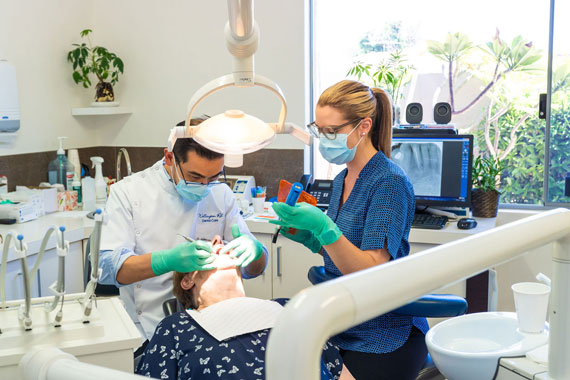Check ups and cleans
Regular check ups are a must to keep your teeth and gums in good shape.
The best way to ensure dental problems are picked up early (and avoided) is by booking a regualr check-up and having regular scale and cleans.
We are a local family dental practice and we love getting to know you!

Why do I need regular dental check ups?
I use an electric tooth brush and nothing hurts. This must mean my teeth and gums are fine, right? Well... not necessarily!
To assess your condition, the dentist will need to inspect the area, and usually perform some tests. Digital radiography (x-rays) is a very useful tool to see what's going on inside the tooth and under the gum - where the dentist is unable to see just by looking. Other tests will also be performed during your assessment to determine the most likely cause of your problem. These tests include checking to see if the nerve inside the tooth is healthy, if the gums are healthy, or if there are cracks within your tooth.
You may not realise you have a problem until it's too late! It's not common knowledge, but our teeth are quite clever and can respond to small amounts of decay (decay is a hole in the tooth) by laying down protective barriers to protect the nerve of the tooth. Often we are unaware of problems starting because of the protective mechanisms our teeth are capable of. It's generally not until later, when the hole is bigger that we get pain! The secret behind this protective mechanism is to do with the different layers of the tooth. The outer layer of the tooth is called enamel, enamel is the strong protective armour of the tooth. The enamel layer can't feel hot or cold or sweet. Generally, a hole starts from the outside of a tooth and begins in the enamel. When it's in the enamel you will have no idea there's a problem there because the enamel has no sensations - just like body armour!
The inner layer of the tooth (dentine) is actually alive and protects the nerve - the nerve is like the heart of the tooth. The dentine is alive, so it can react to different sensations like hot, cold and sweets. Some people can tell when they have a hole that's gotten to this inner layer of the tooth, because their tooth will get sensitive everytime they eat or drink something hot, cold, or sweet. These are the lucky people, because they know it's time to come in and see us and have it fixed with a filling. Other people have no symptoms at all and the hole can just grow and grow and grow until it's huge.
People without symptoms may have an inner layer (dentine) that keeps getting thicker to protect the nerve. This is a problem, because the bigger the hole gets the bigger the chances are that you may need a root canal procedure.
Regular check-up and clean appointments allow us to find holes when they're smaller - this means quicker, smaller fillings for you! A very useful tool to pick up if there are any cavities in teeth, especially between the teeth where the floss goes, are radiographs.
Our gums and the soft tissues (pink skin of the mouth and tongue) can be areas where lumps and bumps can grow undetected. Often if a problem is arising on our soft tissues there is no pain what so ever. Just like you have your skin checked regularly for moles and sun-spots, when you come in for your dental check up, we check your whole mouth for lumps and bumps too.
Are your teeth constanty getting stained? Come in for a check-up and clean and we will be able to get all that staining off - and maybe give you a few pointers on how to keep your teeth whiter for longer.
Do your gums bleed? Have trouble flossing?
Not sure if you're cleaning your teeth right?
When you visit your local dentist for a regular check-up and clean, we can give you advice on making the most out of the time you spend brushing and flossing. Knowing these tips can make a huge difference to the sparkle of your teeth, and even mean you can have longer times between check-ups!
Sometimes, if it's been a while since you last had your teeth cleaned, the gaps between your teeth can actually be filled up with the tartar (scale), making it near impossible to floss comfortably. The floss may have no room to slide down between the teeth,or it may shred the floss. Brushing and flossing should not make your gums bleed AT ALL - if this is you we strongly recommend you book an appointment as soon as possible. Bleeding gums is NOT normal and we can help you to prevent and cure your bleeding gums.